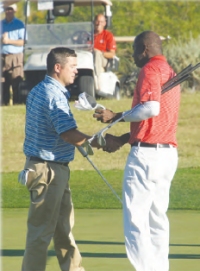Honoring Your Opponent
 Much has been written in the annals of golf about “respecting your opponent.” Merriam- Webster online defines “respect” as “an act of giving particular attention; high or special regard.” This seems appropriate for golf, as we have been taught to respect our opponents from the time we started playing competitive golf.
Much has been written in the annals of golf about “respecting your opponent.” Merriam- Webster online defines “respect” as “an act of giving particular attention; high or special regard.” This seems appropriate for golf, as we have been taught to respect our opponents from the time we started playing competitive golf.
In contrast, relatively little has been written about “honoring your opponent.” Indeed, a Google search of the term “honor your opponent” in relation to golf turns up about 200,000 entries, whereas “respect your opponent” along with the word “golf” returns about 1.7 million entries.
What is the difference in honoring your opponent as opposed to respecting them? If we return to Merriam-Webster, it defines “honor” as “a good name or public esteem; a showing of usually merited respect; one whose worth brings respect or fame.” So, it seems “honor” as a verb is on a higher plane than “respect.”
What does it mean to honor your opponent as opposed to respecting him or her? As Merriam-Webster points out, honor means showing respect. This implies for golf that respect is the feeling or belief you have about your opponent, while honoring them is reflected in your actions.
Simple courtesies that we don’t give a second thought to, such as not standing where our opponent can see us or tending the flagstick, are signs of respect for our opponent, but these are things that we are expected to do as a matter of proper golf etiquette. Honor means more than just shaking your opponent’s hand after the round; it means that whether you win or lose, you do so graciously. Jack Nicklaus’ father told a young Jack that when he lost, he was to shake his opponent’s hand and congratulate him – and mean it.
No finer example of Nicklaus’ sportsmanship could be seen than at the 1977 British Open at Turnberry. He and Tom Watson left the rest of the field in the dust, with Watson carding 65-65 on the weekend to nip Nicklaus’ 65-66. After the final round, Nicklaus told Watson that he threw his best at him, but it wasn’t good enough, and that he was proud of Watson’s performance. Nicklaus went beyond the perfunctory handshake and the mumbling of “well done,” and instead showed a level of class that is rarely seen in sports.
Another example of Nicklaus honoring his opponent happened at the 1969 Ryder Cup at Royal Birkdale. Nicklaus and Tony Jacklin were playing the final match and were all tied heading into the 18th hole. The overall score of the matches was also tied, so the winner of the hole would decide the winner of the Ryder Cup. Jacklin’s birdie putt finished two feet from the hole, and Nicklaus’ own effort finished 4 ½ feet away. In true Nicklaus clutch style, he made the comebacker. Rather than have Jacklin putt his 2-footer and risk losing the overall matches, Nicklaus conceded Jacklin’s putt to assure a halve of the matches.
Another aspect of honoring your opponent is the fact that he or she is taking time out of their day to compete against you. In effect, they are showing you respect by wanting to play in a competitive environment, even if you are just another member of the field in a stroke play event. You are part of a group of people that this person feels is worthy of their time and energy, so we can reciprocate by honoring their effort.
Suppose we have an opponent who does not honor the game or us, and instead is throwing tantrums and basically making a fool of himself? Is such an opponent to be honored? That’s a difficult question. Perhaps the best course of action is to honor the game itself by the way we conduct our actions. These situations are unfortunate, but they do occur, as we all know.
Golf has separated itself from other sports for the respect – and honor – that its participants feel and demonstrate, to both the game and to others. Certainly, it’s one of the many reasons golf appeals to many of us as our favorite endeavor.




